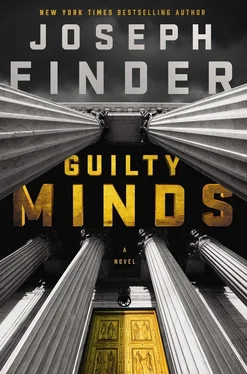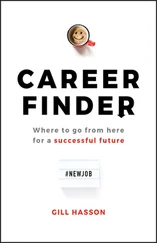“Not if I can help it,” I said.
Fifteen minutes later we arrived at Shays Abbott Burnham’s DC offices, on M Street near where it crossed New Hampshire Avenue. Gideon met us in the law firm’s reception area. He was dressed in khakis and a light blue button-down shirt, open at the neck. His shirt looked crisp and unwrinkled, as if he’d just put it on.
But in contrast to his fresh clothes, he looked depleted and exhausted. Although I barely knew him, I could see the strain he was under. It showed in the deep lines creasing his face, the prominent bags under his eyes, the cluster of wrinkles between his brows. His large eyes glistened, seemingly with tears, but probably from exhaustion.
The overhead fluorescents were off, but in the dim light I could see that the DC headquarters of Shays Abbott were decorated in the same hard white glossy surfaces as the Boston offices — the white stone floors polished like glass, the frosted glass walls, the sharp-edged white leather sofas.
Dorothy seemed a little flustered to meet Gideon Parnell. Even at a time of urgency, this was a fan girl moment for her. She tried not to show how thrilled she was to shake his hand, to be in the presence of such a historic figure. But she couldn’t hide it from me. I had never seen her smile so much and act so deferential. It was as if Jesus Christ himself had come to visit.
Gideon was gracious but terse, and obviously distracted. He led us through a maze of hallways to his office.
“What happened to the forty-eight hours?” I asked.
“Just minutes before the story was posted,” Gideon said, “I received an e-mail from the editor, Julian Gunn, saying that they believed they were in imminent danger of being scooped by a competitor, so they had to run it immediately.”
“That’s a lie,” Dorothy said. “They saw how hard we were pushing back and they wanted to get it out before we disproved it.”
“No,” I said. “That’s not the reason. If they thought we were really going to prove it false, they wouldn’t risk running it. Too damaging to their reputation.”
“We disagree,” Dorothy said to Gideon.
It was out of character for her to contradict me in a meeting with a client. It was a little unprofessional. Not that I cared, particularly. I cut her some slack; she wasn’t herself; she was in the presence of greatness.
“What about the interview with Mandy Seeger this morning?” I asked.
“I canceled it. They broke their side of the deal.”
“I can’t help but wonder whether they ran it earlier because I was rattling the cage,” I said, and Gideon said nothing.
His office looked exactly as I’d expected: spacious, classical, fastidiously neat. Decorated to impress, for public display. There was a long mahogany conference table. A bottle of Old Overholt rye on a shelf. Two of the walls were ego walls, walls of fame, crowded with photographs of Gideon with a litany of the great and the powerful and the famous. My eye was caught by a photo of him in a golf cart with Barack Obama and Bill Clinton.
His assistant, a plain middle-aged blond woman named Rose, who must have come into work early, offered us coffee. It was a little weak, but it did the job.
“We need to talk,” he said.
We gathered around the mahogany table. Gideon sat at the head.
“We are well and truly screwed,” he said. “Has it been picked up by any other websites yet?”
I shook my head.
“Give it a couple of minutes,” Dorothy said.
“I’m sorry about this,” I said. “I really thought we’d have killed this thing by now.”
“Don’t blame yourself,” said Gideon. “This was always a Hail Mary pass.”
“We’re not done yet,” I said.
Gideon looked at me, tilting his head. “What the hell are you talking about? It’s out there now, Heller.”
“Lots of things are out there on the Internet. Websites about how reptile extraterrestrials are running the US government.”
He shook his head, as if in disgust, his eyes closed. “The world has changed since the Kennedy administration. Back then, everybody knew that Jack Kennedy had a parade of women coming through the White House. But not a word of it ever made the papers. Now, anything and everything does. Absolute rubbish gets reported on the basis of nothing more than rumor.”
“Not true,” I said. “It’s just gotten a lot more complicated.”
“If someone snapped a picture of the president with a hooker today, it would be online in minutes.”
“Sure. There’s always some website that’ll publish anything. But the Claflin story hasn’t been picked up by the mainstream media yet. Meaning it hasn’t been validated. That usually takes a while.”
Gideon tilted his head like a Jack Russell Terrier listening to his master’s voice. “I hope you’re right. Go on.”
“You see, right now it exists only on the Internet. As long as it stays an Internet-only story — Slander Sheet, Gawker, TMZ, Drudge, Vice, whatever — it’s just gossip. It’s not news. It doesn’t become permanent until it’s validated by the old ‘legacy’ media. The mainstream media. The Washington Post, The New York Times, The Wall Street Journal . The NBC evening news, NPR, CNN. At that point it’s written in ink. It’s permanent.”
“And when does that happen?”
“You probably know better than me. I don’t know the exact timing. Doesn’t the Times have a morning news meeting or whatever?”
Gideon looked at his watch. “At ten o’clock this morning, The New York Times has their front-page meeting.”
“There you go. Someone’s going to mention the rumor about Claflin and a call girl. They’re not going to ignore it.”
“No, probably not.”
“Who runs the meeting? There’s always one person. It’s not a democracy.”
“The executive editor. I’ve met him.”
“Okay, so the editor’s going to ask, ‘Who else is running with it?’ What they really want to know is, Is anybody else in the mainstream media covering it? Any of the other big dogs? But it’s not going to be any of them. Not this fast. Not in two and a half hours.”
“But this thing’s going to spread like gonorrhea.”
“No doubt. It’ll be picked up first by BuzzFeed or Drudge or TMZ. But that’s not enough to push it over the line into the mainstream. So maybe the Times assigns a couple of reporters to poke around the Slander Sheet story, see if there’s any solid evidence there.”
“But it’s also going to be picked up by some of the more respectable websites like Politico and Roll Call.”
“Maybe. But not the big dogs. Not yet. Does The New York Times have another front-page meeting today?”
“At four-thirty.”
“That’s the one we have to worry about. Four-thirty. Enough time will have gone by that they can at least do a piece about the reaction to this rumor.”
“You’re right. Four-thirty.”
“That’s nine hours from now. Not much time.” I got to my feet. “So what are we doing, sitting here, talking? Dorothy, come on. We’ve got work to do.”
Gideon gave us a conference room to use.
It was like every other office conference room I’d ever seen, only nicer. There was a long, coffin-shaped table, made of mahogany. Around it were arrayed high-backed chairs that seemed to be upholstered in leather. Starfishlike speakerphones were placed every four seats or so. Down one wall ran a long credenza.
Dorothy pushed a button somewhere, and a panel on the far wall slid away, revealing a large video projection screen. She hooked up her laptop to some port built into the table — she worked without hesitation, seeming to know what she was doing — and the bright red Slander Sheet logo came up on the screen.
Читать дальше












